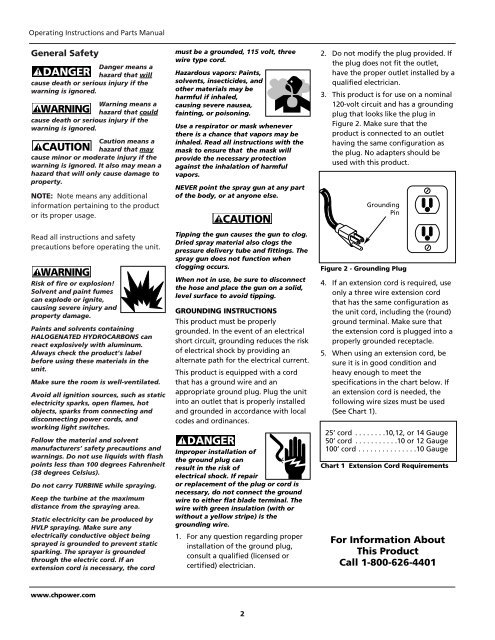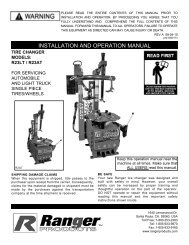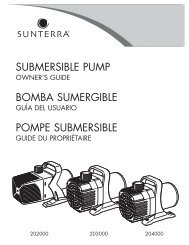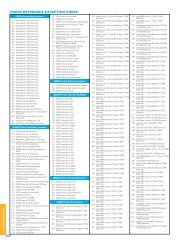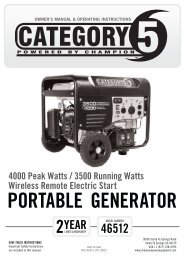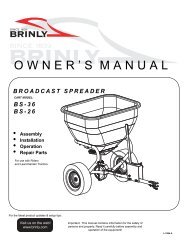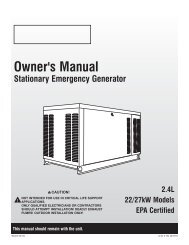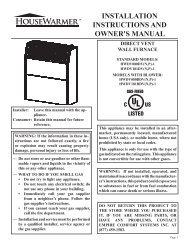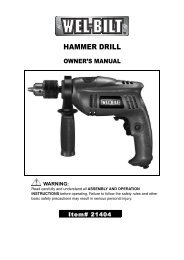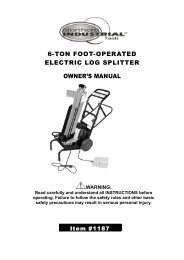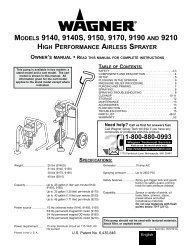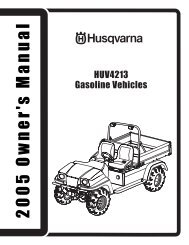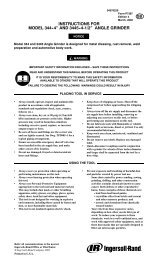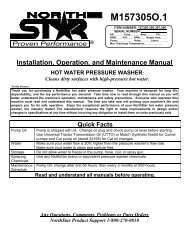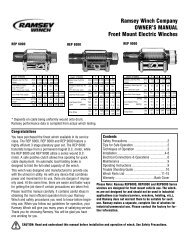HVLP Turbine
HVLP Turbine
HVLP Turbine
You also want an ePaper? Increase the reach of your titles
YUMPU automatically turns print PDFs into web optimized ePapers that Google loves.
Operating Instructions and Parts Manual<br />
General Safety<br />
Danger means a<br />
! DANGER hazard that will<br />
cause death or serious injury if the<br />
warning is ignored.<br />
Warning means a<br />
! WARNING hazard that could<br />
cause death or serious injury if the<br />
warning is ignored.<br />
Caution means a<br />
! CAUTION hazard that may<br />
cause minor or moderate injury if the<br />
warning is ignored. It also may mean a<br />
hazard that will only cause damage to<br />
property.<br />
NOTE: Note means any additional<br />
information pertaining to the product<br />
or its proper usage.<br />
Read all instructions and safety<br />
precautions before operating the unit.<br />
! WARNING<br />
Risk of fire or explosion!<br />
Solvent and paint fumes<br />
can explode or ignite,<br />
causing severe injury and<br />
property damage.<br />
Paints and solvents containing<br />
HALOGENATED HYDROCARBONS can<br />
react explosively with aluminum.<br />
Always check the product’s label<br />
before using these materials in the<br />
unit.<br />
Make sure the room is well-ventilated.<br />
Avoid all ignition sources, such as static<br />
electricity sparks, open flames, hot<br />
objects, sparks from connecting and<br />
disconnecting power cords, and<br />
working light switches.<br />
Follow the material and solvent<br />
manufacturers’ safety precautions and<br />
warnings. Do not use liquids with flash<br />
points less than 100 degrees Fahrenheit<br />
(38 degrees Celsius).<br />
Do not carry TURBINE while spraying.<br />
Keep the turbine at the maximum<br />
distance from the spraying area.<br />
Static electricity can be produced by<br />
<strong>HVLP</strong> spraying. Make sure any<br />
electrically conductive object being<br />
sprayed is grounded to prevent static<br />
sparking. The sprayer is grounded<br />
through the electric cord. If an<br />
extension cord is necessary, the cord<br />
www.chpower.com<br />
must be a grounded, 115 volt, three<br />
wire type cord.<br />
Hazardous vapors: Paints,<br />
solvents, insecticides, and<br />
other materials may be<br />
harmful if inhaled,<br />
causing severe nausea,<br />
fainting, or poisoning.<br />
Use a respirator or mask whenever<br />
there is a chance that vapors may be<br />
inhaled. Read all instructions with the<br />
mask to ensure that the mask will<br />
provide the necessary protection<br />
against the inhalation of harmful<br />
vapors.<br />
NEVER point the spray gun at any part<br />
of the body, or at anyone else.<br />
! CAUTION<br />
Tipping the gun causes the gun to clog.<br />
Dried spray material also clogs the<br />
pressure delivery tube and fittings. The<br />
spray gun does not function when<br />
clogging occurs.<br />
When not in use, be sure to disconnect<br />
the hose and place the gun on a solid,<br />
level surface to avoid tipping.<br />
GROUNDING INSTRUCTIONS<br />
This product must be properly<br />
grounded. In the event of an electrical<br />
short circuit, grounding reduces the risk<br />
of electrical shock by providing an<br />
alternate path for the electrical current.<br />
This product is equipped with a cord<br />
that has a ground wire and an<br />
appropriate ground plug. Plug the unit<br />
into an outlet that is properly installed<br />
and grounded in accordance with local<br />
codes and ordinances.<br />
! DANGER<br />
Improper installation of<br />
the ground plug can<br />
result in the risk of<br />
electrical shock. If repair<br />
or replacement of the plug or cord is<br />
necessary, do not connect the ground<br />
wire to either flat blade terminal. The<br />
wire with green insulation (with or<br />
without a yellow stripe) is the<br />
grounding wire.<br />
1. For any question regarding proper<br />
installation of the ground plug,<br />
consult a qualified (licensed or<br />
certified) electrician.<br />
2<br />
2. Do not modify the plug provided. If<br />
the plug does not fit the outlet,<br />
have the proper outlet installed by a<br />
qualified electrician.<br />
3. This product is for use on a nominal<br />
120-volt circuit and has a grounding<br />
plug that looks like the plug in<br />
Figure 2. Make sure that the<br />
product is connected to an outlet<br />
having the same configuration as<br />
the plug. No adapters should be<br />
used with this product.<br />
Grounding<br />
Pin<br />
Figure 2 - Grounding Plug<br />
TEST RESET<br />
4. If an extension cord is required, use<br />
only a three wire extension cord<br />
that has the same configuration as<br />
the unit cord, including the (round)<br />
ground terminal. Make sure that<br />
the extension cord is plugged into a<br />
properly grounded receptacle.<br />
5. When using an extension cord, be<br />
sure it is in good condition and<br />
heavy enough to meet the<br />
specifications in the chart below. If<br />
an extension cord is needed, the<br />
following wire sizes must be used<br />
(See Chart 1).<br />
25’ cord . . . . . . . .10,12, or 14 Gauge<br />
50’ cord . . . . . . . . . . .10 or 12 Gauge<br />
100’ cord . . . . . . . . . . . . . . .10 Gauge<br />
Chart 1 Extension Cord Requirements<br />
For Information About<br />
This Product<br />
Call 1-800-626-4401


